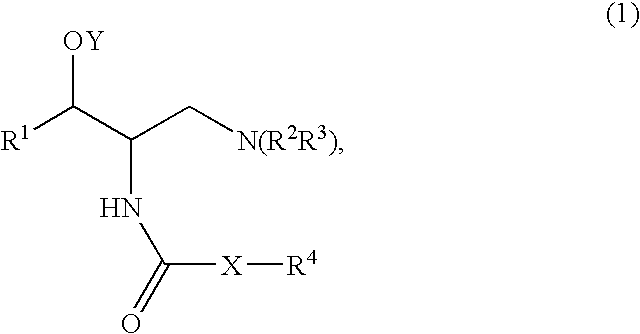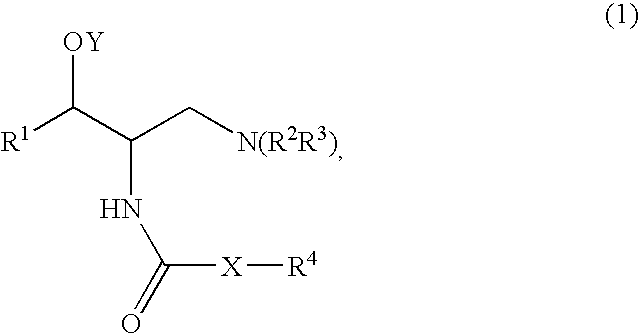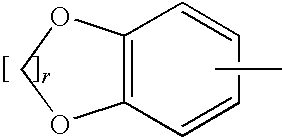Method of treating polycystic kidney diseases with ceramide derivatives
a technology of ceramide and polycystic kidney, applied in the direction of biocide, heterocyclic compound active ingredients, drug compositions, etc., can solve the problems of no approved treatment or cure for pkd, reducing kidney function, kidney failure, etc., and reducing the need for kidney dialysis. , the effect of mild symptoms
- Summary
- Abstract
- Description
- Claims
- Application Information
AI Technical Summary
Benefits of technology
Problems solved by technology
Method used
Image
Examples
example 1a
Synthetic Route 1
[0184]
Method 1
[0185]A mixture of Compound A (1 mmol), such as (1R,2R)-2-amino-1-(2,3-dihydrobenzo[β][1,4]dioxin-6-yl)-3-(pyrrolidin-1-yl)propan-1-ol, an acid (Compound B, 1.2 mmol), DCC (dicyclohexylcarbodiimide, 1.2 mmol) and HOBT (1-hydroxy benzotriazole, 1.2 mmol) was dissolved in CH2Cl2 (5 ml). The mixture was stirred at room temperature and monitored by TLC (thin liquid chromatography) for completion. After completion the mixture was filtered and purified by column chromatography using, for example, a mixture of (CH2Cl2 / MeOH / NR4OH).
Method 2
[0186]A mixture of Compound A (1 mmol), such as (1R,2R)-2-amino-1-(2,3-dihydrobenzo[β][1,4]dioxin-6-yl)-3-(pyrrolidin-1-yl)propan-1-ol, an acid (Compound B, 1.2 mmol) and DCC (dicyclohexylcarbodiimide, 1.2 mmol) was dissolved in CHCl3 (5 ml). The mixture was placed in the microwave reactor (T=120° C., time=1 min) and it was then filtered and purified by column chromatography using, for example, a mixture of (CH2Cl2 / MeOH / NH4OH...
example 1b
Synthetic Route 2
[0188]
[0189]Compound A, such as (1R,2R)-2-amino-1-(2,3-dihydro-benzo[1,4]dioxin-6-yl)-3-pyrrolidin-1-yl-propan-1-ol, was coupled with a variety of N-hydroxysuccinamide esters (Compound D prepared according to the method below) in methylene chloride under an atmosphere of nitrogen, for example, for 18 to 24 hours depending on the ester used.
Preparation of N-Hydroxysuccinamide Esters
[0190]
[0191]Various mono- and di-keto acids were coupled with N-hydroxysuccinamide in the presence of N,N1-dicyclohexylcarbodiimide in ethyl acetate under an atmosphere of nitrogen for 18 hours. The products were filtered to remove the dicyclohexylurea. The identity of these esters was confirmed by 1H NMR and the crude material was then used in the preparation of amide analogs without further purification.
PUM
| Property | Measurement | Unit |
|---|---|---|
| temperature | aaaaa | aaaaa |
| temperature | aaaaa | aaaaa |
| temperature | aaaaa | aaaaa |
Abstract
Description
Claims
Application Information
 Login to View More
Login to View More - R&D
- Intellectual Property
- Life Sciences
- Materials
- Tech Scout
- Unparalleled Data Quality
- Higher Quality Content
- 60% Fewer Hallucinations
Browse by: Latest US Patents, China's latest patents, Technical Efficacy Thesaurus, Application Domain, Technology Topic, Popular Technical Reports.
© 2025 PatSnap. All rights reserved.Legal|Privacy policy|Modern Slavery Act Transparency Statement|Sitemap|About US| Contact US: help@patsnap.com



